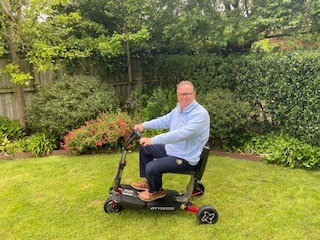Teaching resilience through lived experience

Howard Clark is a passionate teacher. His long career started at a primary school, from which he transitioned to St Patrick’s College in Ballarat, an all-boys school, where he has been teaching for 26 years.
After taking on a variety of roles, Howard now teaches mathematics and religion to years nine through 12. He also mentors graduate staff and students, and he values the open exchange he has been able to foster with his students about disability and resilience.
“With Covid, the boys are currently going through a really difficult situation, and I keep telling them that in the longer term, this is going to build their resilience and be a kind of blessing for them, similar to my disability,” he says.
Howard had to build his resilience at a similar age. When he was 17, doctors found a tumour in his back, which had to be removed. The diagnosis came at a key moment for him.
“I had just been drafted to Melbourne Football Club, and before I played my first game, I had to have this seven-centimetre-long tumour removed from the L5 region. So, my football career finished before it started,” he remembers.
“That was the start of a long journey, which I am still on now, with 20 tumours, six discs and seventeen laminae removed from my spine.”
While his dreams of being a professional footballer ended there, his passion for the sport didn’t, and he is now the Director of Football at St Patrick’s.
Howard says, “Football’s a huge component of the sports in our school, and we’re very, very successful. I’ve extended my passion to coaching and to the development of the players and students.”
In 2019, Howard started developing difficulties walking, which made certain aspects of his role more difficult.
“I always knew that I was going to lose the use of my legs, and I now have to use a walking frame full time,” he explains. “But because of my role as the Director of Football, I also have to be offsite at times. Part of our football programme is that we go to Darwin, London and Melbourne, and this includes a lot of walking. There’s no way I could just use the walking frame for these trips.”
It was clear to him he would need a scooter, so he got in touch with JobAccess and applied online for assistance via the Employment Assistance Fund (EAF).
“It was incredibly easy, I was able to sit down and apply without any issues at all,” he recounts.
After his application was received, JobAccess then organised a workplace assessment by a qualified assessor, who was able to inspect the school despite Covid restrictions.
With his new scooter, Howard’s ease of access has increased greatly. “What I do is I drive the scooter up to school and park it next to my classroom. My walking frame is attached to a bracket on the scooter, so I can then take it off, wheel it into the classroom and hold on to it while I teach. It works really well,” Howard explains.
The scooter is foldable and portable, meaning that he can take it along on the football team’s trips.
“It’s been great, and the support JobAccess has given me has really impressed both me and my family. It has made my life so much easier,” he adds.
Howard encourages people with disability experiencing barriers at work to get in touch with JobAccess regarding potential workplace adjustments and support.
“I’d say, contact JobAccess and they will walk you through it. You don’t need to be isolated and by yourself. There are organisations like JobAccess that can make your life so much easier,” he says.
He is also a strong advocate for disability employment, and the benefits it can bring to an organisation.
“The school community is enriched because of my disability. I think when an organisation pushes themselves beyond the superficial and goes deeper, and gives everyone opportunities, they will grow through that experience,” he shares.
“And for that person (who gets an opportunity), it means that they have can have hope. The impact of employing and supporting someone with disability is very far reaching.”
Funded by the Australian Government and delivered by industry professionals, JobAccess provides free and expert support to help remove barriers to employing people with disability. This includes an advice service, employer engagement team, and workplace adjustments, support and training. Not all employees with disability will require adjustments, but if they do, JobAccess can help manage the process from start to finish, including arranging a free workplace assessment. Call 1800 464 800 to speak with a JobAccess Adviser.
Last updated:
